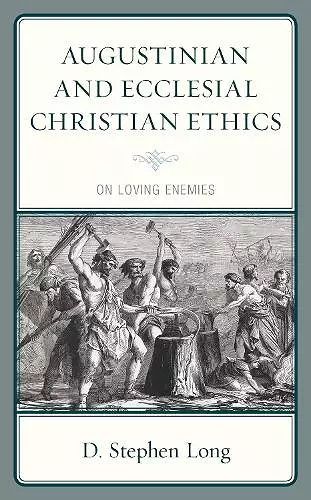Augustinian and Ecclesial Christian Ethics
On Loving Enemies
Format:Hardback
Publisher:Bloomsbury Publishing PLC
Published:15th Aug '18
Currently unavailable, and unfortunately no date known when it will be back

What is the relationship between the command to love one’s enemies and the use of violence and/or other coercive political means? This work examines this question by comparing and contrasting two important contemporary approaches to Christian ethics, neoAugustinian and the ecclesial or neoAnabaptist. It traces the complicated conversation that has taken place since John Howard Yoder took on Reinhold Niebuhr’s interpretation of the Anabaptists in the 1940’s. It consists of three parts. The first part traces the development of the Augustinian-Niebuhrian approach to ethics from Niebuhr through those who have advanced his work including Paul Ramsey, Timothy Jackson, Charles Mathewes, Eric Gregory, and Jennifer Herdt. It also examines the Augustinian ethics of Oliver O’Donovan, John Milbank and Nicholas Wolterstorff. Along with tracing the Augustinian approach and its trajectories through agapism, theology and the interpretation of Augustine, it identifies fifteen criticisms that this approach brings against the neoAnabaptists. The second part traces the origin of the ecclesial or neoAnabaptist approach, and then examines its relationship to, and criticism of, agapism, what theological doctrines are central and its interpretation of Augustine. Its purpose is primarily constructive by explaining the role that ecclesiology, Christology and eschatology have among the neoAnabaptists. The third part addresses the criticisms levied by Augustinians against the neoAnabaptists by drawing on the constructive theology in the second part. It intends to show where the Augustinian critics are correct, where they have missed key theological teachings, and where they misrepresent. It also assesses the summons to the nationalist project the Augustinians put to the neoAnabaptists. If this work is successful, this third part will not be defensive. It will instead illumine the reasons for the criticisms and suggest means by which the conversation that began between Yoder and Niebuhr can continue and possibly bear fruit for theological ethics in both its ecclesial and nationalist projects for generations to come.
This book, copious in detail and heavily footnoted, is an indispensable guide to scholars seeking to make their way through the thickets of these two approaches in Christian ethics. . . [it's] a wonderful resource, and should be required reading for those involved in sorting out the complex questions of what Christian participation in the life of the world looks like. * Reading Religion *
With mentors and peers in either approach to Christian ethics and political theology--the new Augustinians and the ecclesial project--I have felt like a chimera while attempting to sort through their respective strengths and weaknesses, points and counterpoints, subtleties and nuances. With this comprehensive and incisive text, D. Stephen Long judiciously and coherently advances this momentous interchange. I gratefully and enthusiastically recommend! -- Tobias Winright, Hubert Mäder Chair of Health Care Ethics, Saint Louis University
Managing to sustain a single well-construed argument throughout, D. Stephen Long defends an ecclesially-centered Augustinian politics against rival ways of appropriating Augustine for late modern political orders. The real benefit of this impressive work is the patience and charity (even friendship) that runs through it, embodying the politics it champions and giving us hope for how these conversations can go. -- Jonathan Tran
ISBN: 9781978702011
Dimensions: 236mm x 160mm x 27mm
Weight: 649g
328 pages